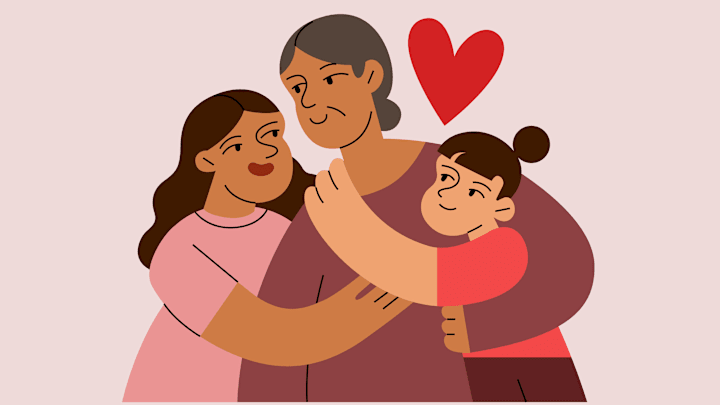The words we use for family members in English are specific about some things, and vague about others. Our vocabulary marks a distinction between our mother and her sisters (some languages use one word to refer to mothers and maternal aunts), but doesn’t say whether siblings are older or younger (some languages have different words for brother and sister depending on their age relative to you). We lack words that pick out particular family members (we have cousin, but what about child-of-my-father’s-brother?) as well as certain general terms (we have siblings for brothers-and-sisters, but what about nieces-and-nephews?).
If you look hard enough, you can find some words to help fill in the gaps. Here are 11 unusual English kinship words for family members.
Patruel

This one means “child of your paternal uncle” as well as “a child of your own brother.” It hasn't gotten a lot of use in the past few centuries, but it was once convenient to have a term for this relationship because it factored into royal succession considerations. The first citation for it in the OED, from 1538, reads, “Efter his patruell deid withoutin contradictioun he wes king.”
Avuncle

Your mother’s brother. Latin distinguished between patruus, father's brother, and avunculus, mother's brother. (There was also amita, father’s sister, and matertera, mother’s sister.) It’s the root of the word avuncular, meaning “having to do with uncles” or “uncle-like” (i.e., kind and friendly, like an uncle). You won’t find the word avuncle in the dictionary, but it has been used in anthropology texts and in papers concerning royal matters.
Niblings

Your nieces and nephews. You won’t find nibling in the dictionary either, but use of this term seems to be growing among favorite aunts and uncles who want an easy way to refer to their little bundles of sibling-provided joy in a collective or gender-neutral way.
Fadu

Your father’s sister. Latin amita covers this relationship, but we don’t have to reach that far back to find an English equivalent. Old English made a distinction between aunts and uncles depending on whether they were maternal or paternal. We lost all that when we borrowed the more general aunt and uncle from French.
Modrige

“Your mother’s sister,” from Old English.
Fœdra

“Your father’s brother,” from Old English.
Eam

Your mother’s brother. It survived in some dialects as eme, with a more general meaning of “uncle” or “friend,” into the 19th century.
Brother-uterine

Your half-brother from the same mother. This is a term used in old legal documents or other discussions of inheritance and succession. Half-siblings of the same mother are uterine and of the same father are consanguine.
Brother-german

Full brother, sharing both parents. Nothing to do with Germany. The german here is related to germane, which originally meant “of the same parents” and later came to mean just “related” or “relevant.”
Double cousin

This term refers to a full first cousin, sharing all four grandparents. This comes about when a pair of sisters marries a pair of brothers, among other circumstances.
Machatunim

The parents of your child’s spouse. Your child’s in-laws. OK, this is a Yiddish word, but one that, like a lot of Yiddish words, has poked its way into English because it fills a gap. When it comes to marriage, this can be a very important relationship, so it’s good to have a word for it. If your parents get along with their machetunim, the family—the whole mishpocheh—will be happier.
Discover More Stories About Words:
A version of this story was published in 2014; it has been updated for 2025.
